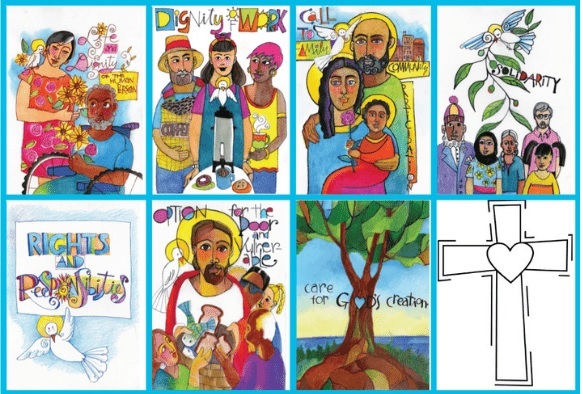Catholic Social Teaching

Catholic Social teaching (CST) has its roots int he Hebrew prophets who announced God’s special love for the poor and called God’s people to a covenant of love and justice. It is a teaching founded on the life and words of Jesus Christ, who came “to bring glad tidings to the poor…liberty to captives…recovery of sight to the blind” Luke 4:18-19 CST is built on a commitment to the poor.
The Church’s social teaching is a rich treasure of wisdom about building a just society and living lives of holiness amidst the challenges of modern society. Modern Catholic social teaching has been articulated through a tradition of papal, conciliar, and episcopal documents. The depth and richness of this tradition can be understood best through a direct reading of these documents. In these brief reflections, we will highlight several of the key themes that are at the heart of our Catholic social tradition.
CST “emerges from the truth of what God has revealed to us about himself. We believe in the triune God whose very nature is communal and social. God the Father sends his only Son Jesus Christ and shares the Holy Spirit as his gift of love. God reveals himself to us as one who is Trinity. Therefore, we who are made in God’s image share this communal, social nature. We are called to reach out and to build relationships of love and justice.
CST is based on and inseparable from our understanding of human life and human dignity. Every human being is created in the image of God and redeemed bu Jesus Christ, and therefore is invaluable and worthy of respect as a member of the human family. Far too many Catholics are not familiar with the basic content of Catholic Social Teaching. More fundamentally, many Catholics do not adequately understand that Catholic Social Teaching is an essential part of Catholic faith. This poses a serious challenge for all Catholics, since it weakens our capacity to be a Church that is true to the demands of the Gospel. (US Conference of Catholic Bishops)
Principals:
The Principal of Human Dignity
Every human being is created in the image of God and redeemed by Jesus Christ, and therefore is invaluable and worthy of respect as a member of the human family” (USCCB)
This is the bedrock principal of Catholic social teaching. Every person–regardless of race, sex, age, national origin, religion, sexual orientation, employment or economic status, health, intelligence, achievement any other differentiating characteristic–is worthy of respect.; It is not what you do or what you have that gives you a claim on respect. It is simply being human that establishes your dignity. Given that dignity, the human person is, in the Catholic view, never a means, always an end.
The Body of Catholic social teaching opens with the human person, but it does not close there. Individuals have dignity; individualism has no place in Catholic social thought. The principal of human dignity gives the human person a claim on membership in a community, the human family.
The Principal of the Respect for Human Life
Every person, from the moment of conception to natural death, has inherent dignity and a right to life with that dignity. (USCCB)
Human life at every stage of development and decline is precious and therefore worthy of protection and respect. It is always wrong to directly attack innocent human life. The Catholic tradition sees the sacredness of human life as part of any moral vision for a just and good society.
The Principal of Association
Our tradition proclaims that the person is not only sacred but also social. How we organize our society- in economics and politics, in law and policy – directly affects human dignity and the capacity of individuals to grow in community.
The centerpiece of society is the family; family stability must always be protected and never undermined. By association with others – in families and in other social institutions that foster growth, protect dignity and promote the common good – human persons achieve their fulfillment.
The Principal of Participation
We believe people have a right and duty to participate in society, seeking together the common good and well-being of all, especially the poor and vulnerable. Without participation, the benefits available to an individual through any social institution cannot be realized. The human person has a right not to be shut out from participating in those institutions that are necessary for human fulfillment. This principal applies in a special way to conditions associated with work. Work is more than a way to make a living; it is a form of continuing participation in God’s creation. If the dignity of work is to be protected, then the basic rights of workers must be respected – the right to productive work, to decent and fair wages, to organize and join unions, to private property, and to economic initiative. (USCCB)
The Principal of Preferential Protection for the Poor and Vulnerable
In a society marred by deepening divisions between rich and poor, our tradition recalls the story of the last judgement (Mt. 25:31-46) and instructs us to put the needs of the poor and vulnerable first. (USCCB)
Why is this so? Because the common good – the good of society as a whole requires it. The opposite of rich and powerful is poor and powerless. If the good of all, the common good, is to prevail, preferential protection must move toward those affected adversely by the absence of power and the presence of privation. Otherwise, the balance needed to keep society in one piece will be broken to the detriment of the whole.
The Principal of Solidarity
Catholic social teaching proclaims that we are our brothers’ and sisters’ keepers, wherever they live. We are one human family…Learning to practice the virtue of solidarity means learning that’loving neighbor’ has global dimensions in an independent world (USCCB)
The principal of solidarity functions as a moral category that leads to choices that will promote and protect the common good.
The Principal of Stewardship
The Catholic tradition insists that we show our respect for the Creator by our stewardship of creation. (USCCB) The steward is a manager, not an owner. In an era of rising consciousness about our physical environment, our tradition is calling us to a sense of moral responsibility for the protection of the environment – croplands, grasslands, woodlands, air, water, minerals and other natural deposits. Stewardship responsibilities also look toward our personal talents, our attention to personal health and our use of personal property.
The Principal of Subsidiarity
This principal deals chiefly with “the responsibilities and limits of government, and the essential roles of voluntary associations” (USCCB) The principal of subsidiary puts a proper limit on government by insisting that no higher level of organization should perform any function that can be handled efficiently and effectively at a lower level of organization by human persons who, individually or in large group, are closer to the problems and closer to the ground. Oppressive governments are always in violation of the principal of subsidiarity; overactive governments frequently violate this principal.
The Principle of the Common Good
“The common good is understood as the social conditions that allow people to reach their full human potential and to realize their human dignity” (USCCB). The social conditions the bishops have in mind presuppose “respect for the person,” “the social well-being and development of the group” and the maintenance by public authority of “peace and security.” Today, “in an age of global interdependence,” the principle of the common good points to the “need for international structures that can promote the just development of the human family across regional and national lines.”
What constitutes the common good is always going to be a matter for debate. The absence of any concern for or sensitivity to the common good is a sure sign of a society in need of help. As a sense of community is eroded, concern for the common good declines. A proper communitarian concern is the antidote to unbridled individualism, which, like unrestrained selfishness in personal relations, can destroy balance, harmony and peace within and among groups, neighborhoods, regions and nations.





